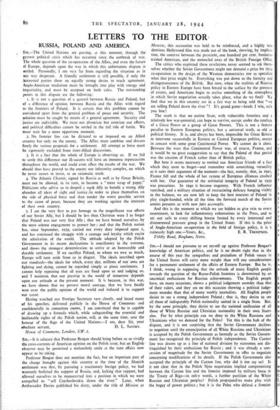Snt,—It is salutary that Professor Brogan should bring before us
so vividly the cross-currents of American opinion on the Polish issue, but an English• observer may be permitted a melancholy smile at the turn affairs now appear to be taking. Professor Brogan does not mention the fact, but an important part of the charge brought against this country at the time of the Munich settlement was that, by pursuing a reactionary foreign policy, we had wantonly forfeited the support of Russia, and, lacking that support, bad allowed ourselves to be manoeuvred into a position in which we were compelled to " sell Czechoslovakia down the river." Later, when Ambassador Davies published his diary, under the title of Mission to Moscow, this accusation was held to be reinforced, and a highly ten- dentious Hollywood film was made out of the book, showing, by implica- tion, the contrast between the prescient, one hundred per cent. business- trained American, and the monocled asses of the British Foreign Office.
The critics who exploited these revelations never seemed to ask them- selves whether the Soviet Government might not demand a price for the.' co-operation in the design of the Western democracies nor to speculate what tharprice might be. Everything was put down to the fortuity and disingenuousness of the British. But now, when the realities of Russian policy in Eastern Europe have been forced to the surface by the pressure of events, and Americans begin to realise something of the atmosphere in which Soviet negotiation actually takes place, what do we find? We find that we in this country are in a fair way to being told that " we are selling Poland down the river "! It's grand game—heads I win, tails you lose!
The truth is that no nation State, with vulnerable frontiers and a relatively low war-potential, can hope to survive, except under the tutelage of a Great Power or a group of Great Powers. This is not a feature peculiar to Eastern European politics, but a universal truth, as old as political history. It is, and always has been, impossible for Great Britain to intervene successfully in Eastern or Central European politics, except in concert with some great Continental Power. We cannot do it alone. Between the wars that Continental Power was, of course, France, and it would be no great exaggeration to say that the Poland of that period was the creation of French rather than of British policy.
But here it seems necessary to remind our American friends of a fact which they seem to forget—and remember with astonishing versatility as it suits their argument of the moment—the fact, namely, that, in 1940, France fell and the whole of her system of European alliances crashed with her. Our guarantee of the territorial integrity of Poland in 1939 was precarious. In 1940 it became nugatory. With French influence vanished, and a military situation of excruciating delicacy hanging visibly in the balance, we are now left to keep the best interests of Poland- in play single-handed, while all the time the forward march of the Soviet armies presents us with new faits accomplis.
And this is the moment at which we are bidden to give rein to every resentment, to look for inflammatory exhortations in the Press, and to set our sails to every shifting breeze fanned by every interested and disinterested pressure group in the United States. If • this is the price of Anglo-American co-operation in the field of foreign policy, it is 'a ruinously high one.—Yours, &c., E. R. THOMPSON. Tithbj, Road, Bingham, Notts.


























 Previous page
Previous page